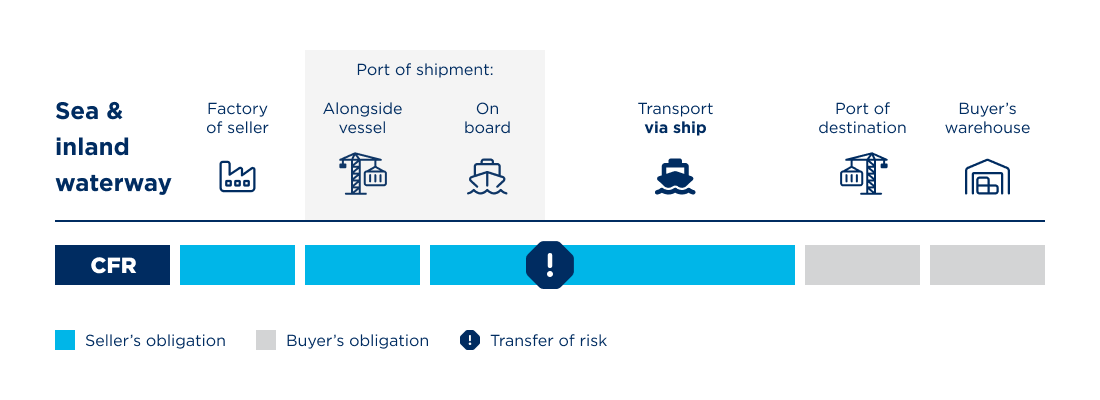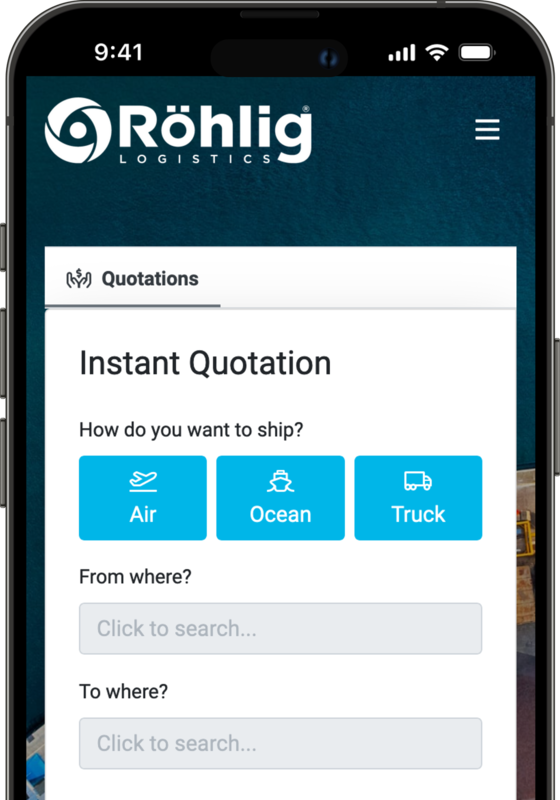The CFR Incoterm is one of the four Incoterms that are exclusively intended for transport by ship, with a clear focus on conventional sea transport. CFR is less suitable for container transport (but can be used in exceptional cases, more on this later). CFR stands for ‘Cost and Freight’. This means that the seller is responsible for the transport to the named port of destination (organisation plus costs). As an alternative to delivery, the seller can also procure goods that are ready for shipment to the port of destination (this is particularly common in chain sales or ‘strings of sales’ in commodities trading, such as oil, metals and agricultural products).
CFR shipping is a two-point clause
Important detail: While the seller still bears the costs of transport Ex Works (if applicable) and via the port of delivery or shipment to the port of destination, the risk for the transport is already transferred to the buyer from the time of delivery at the port of shipment. The delivery obligation is therefore already fulfilled when the goods are handed over to the carrier in accordance with the contract. As soon as the goods are on board, the buyer bears the risk of loss or damage.
Insurance by the buyer makes sense
As it is often assumed that the responsibility for the transport also involves bearing the risks, it is recommended that the buyer takes out suitable insurance for the CFR transport from the port of shipment to the port of destination.
Alternatively, the buyer can choose the Incoterm CIF, which requires the seller to take out insurance for the transport section. Here, too, we would like to draw attention to the fact that although the seller takes out insurance in the buyer’s favour, the buyer continues to bear the risk.
Tip: Consider whether the buyer can obtain more favourable conditions from an insurance company than the seller can from CIF (who will likely pass on these costs). Global importers typically enjoy attractive discounts on their insurance policies.
Practical tip for CFR terms: Also state the port of shipment
To ensure that the exact location of the transfer of risk is clear for the buyer and seller, not only the port of destination should be listed when agreeing on the CFR Incoterm, but also the port of shipment, ideally with a precise indication of the location at which the delivery is made by the seller. Additional note: Often several carriers are involved in the transport of the goods (e.g. first a feeder ship, then an ocean-going vessel). Unless otherwise agreed, the risk is always transferred to the buyer from the first carrier.
CFR Cargo: Less recommendable for container transport
The traditional CFR Incoterm intended for sea transport assumes that the seller brings the goods on board the ship. However, a container is usually handed over at a container terminal and comes into the care of a third party - but the risk remains with the seller until the goods are on board the ship.
For container transport, the Incoterm CPT should be chosen as an alternative. In this case, the goods are deemed to have been delivered when they are handed over to the first carrier (e.g. handover at a container terminal), at which point the risk is also transferred to the buyer.
CFR (Cost and Freight): Costs for the seller in detail
The expenses for transport to the port of destination also include - if applicable - all measures and costs associated with the export, including the necessary pre-shipment inspections. If necessary, the seller must pack and label the goods for transport at their own expense. If they require documents and information from the buyer for the export, they pay the associated costs. The seller is also responsible for preparing delivery and transport documents for the buyer so that the buyer can take delivery of the goods. With this transport document, the buyer must be able to demand the handover of the goods from the carrier at the port of destination. It must also be possible to sell the goods during transport - for example in the form of a bill of lading, which acts as a bearer document. If a sale during transport is not planned and/or the goods have already been paid for in advance, a sea waybill may be sufficient (this is not a bearer document but proves the conclusion of a contract of carriage and serves as a freight receipt).
If the seller's contract of carriage also includes unloading costs, they must of course bear these and may not claim them back from the buyer (unless this has been agreed). As a rule, however, the buyer is responsible for unloading, including quay charges and lighterage costs.
CFR Cost: Overview of costs for the buyer
The buyer pays all expenses relating to import and transit - depending on whether this is appropriate (customs duties, taxes, etc.). However, a different allocation of costs may be agreed between the buyer and seller. If the buyer was supported by the seller with documents and information, the buyer bears the costs for the seller's efforts. If the seller incurs additional costs due to the buyer's failure to comply with the notification obligation - for example at the time of shipment if a period has been agreed in advance - then the buyer must bear these costs.
The more details you include in an Incoterm, the lower the chance of misunderstandings.
With CFR, we recommend listing the port of shipment as well as the port of destination. The port of destination should also state the exact location where the transfer of costs takes place. It should be clear who pays for which services at the port of destination.
- If you want the seller to insure the transport to the port of destination, choose the Incoterm CIF (Cost, Insurance and Freight).
- For multimodal transports where different means of transport are used, choose Incoterms that can be used universally. These are all other Incoterms in addition to the trade terms CIF, CFR, FOB and FAS, which are only intended for sea and inland waterway transport.
- The Incoterm CPT is preferable for container transport (see FAQ 1 above). Here too, the variant including insurance is possible with CIP - the seller also takes out insurance.
- If the buyer is to pay for the transport from the first carrier, choose FCA or - for conventional sea transport - also the Incoterms FOB and FAS.


